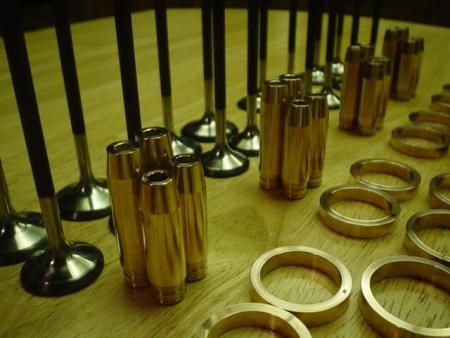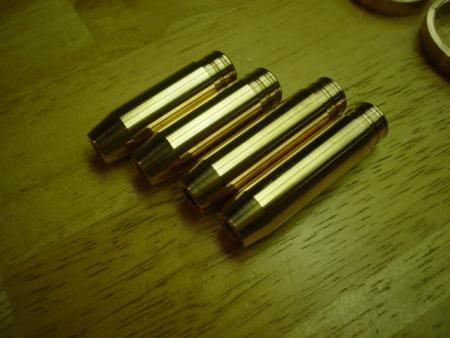Navigation
Install the app
How to install the app on iOS
Follow along with the video below to see how to install our site as a web app on your home screen.
Note: This feature may not be available in some browsers.
More options
Style variation
-
Congratulations TugboatEng on being selected by the Eng-Tips community for having the most helpful posts in the forums last week. Way to Go!
You are using an out of date browser. It may not display this or other websites correctly.
You should upgrade or use an alternative browser.
You should upgrade or use an alternative browser.
What valve seat material for Titanium Valves. 3
- Thread starter ZoRG
- Start date
- Status
- Not open for further replies.
- Thread starter
- #21
- Thread starter
- #24
- Thread starter
- #26
- Thread starter
- #28
You might have an issue with bronze guides being considerably softer than cast iron and thus wearing faster.
They're used extensively on race engines because, in spite of their poor wear characteristics, they conduct heat away from the valve stem much better than do iron guides. Race engines are torn-down frequently, so high wear rates are acceptable.
That's where the beryllium-copper guides really shine: they have a higher thermal conductivity than bronze alloys, and a hardness equivalent to that of cast iron.
It requires different machining techniques, but these are well-understood, and I'm not sure that machining the stuff releases any "free" beryllium, so the health hazards are minimal - at least, I'm still alive, having done it off and on since 1975.
- R
They're used extensively on race engines because, in spite of their poor wear characteristics, they conduct heat away from the valve stem much better than do iron guides. Race engines are torn-down frequently, so high wear rates are acceptable.
That's where the beryllium-copper guides really shine: they have a higher thermal conductivity than bronze alloys, and a hardness equivalent to that of cast iron.
It requires different machining techniques, but these are well-understood, and I'm not sure that machining the stuff releases any "free" beryllium, so the health hazards are minimal - at least, I'm still alive, having done it off and on since 1975.
- R
- Thread starter
- #31
- Thread starter
- #33
- Thread starter
- #35
Not sure, if you want long life, go with silicone bronze guides, the material is cheap as well...
Manganese have better performance with acceptable wear, the material is also cheap, we will be doing a run 30 or so sets of Manganese guides soon.
Beryllium/copper is very expensive, if you wont be running titanium valves, don't bother. Same with trojan, it is very expensive, the material cost alone is about as much as you would pay for a set of manganese guides, but look at it as a replacement for beryllium/copper with better properties, no toxic elements, and slightly cheaper. Drilling it is tricky but a carbide drill will solve that, but it machines really nice, the above pictures doesn't really do it justice. These are better:


Manganese have better performance with acceptable wear, the material is also cheap, we will be doing a run 30 or so sets of Manganese guides soon.
Beryllium/copper is very expensive, if you wont be running titanium valves, don't bother. Same with trojan, it is very expensive, the material cost alone is about as much as you would pay for a set of manganese guides, but look at it as a replacement for beryllium/copper with better properties, no toxic elements, and slightly cheaper. Drilling it is tricky but a carbide drill will solve that, but it machines really nice, the above pictures doesn't really do it justice. These are better:


- Thread starter
- #37
rpmag
Automotive
- Oct 15, 2004
- 105
to change valve dimensions to suit, yes. For the inserts/valves no. This would need to be done by someone else, which is not difficult to arrange but I had not planned on the cost of the valve seat material. I was attracted to the idea after seeing so many Del West valve sets with collets sell for $50 or so.
The picture above show some very nice work. What are they going in and why did you choose the given material?
The picture above show some very nice work. What are they going in and why did you choose the given material?
Here is a another source of information on Beryllium Copper Alloys. Their Materials Research Laboratories used to be an excellent source of information and were very good people to work with.
Not sure where Zorg is getting his materials data, but shows a common, readily machinable beryllium-copper alloy having considerably greater hardness and 2.5 - 4 times the thermal conductivity of silicon-bronze alloys.
- Status
- Not open for further replies.
Similar threads
- Replies
- 65
- Views
- 4K
- Replies
- 12
- Views
- 31K
- Question
- Replies
- 13
- Views
- 7K
- Locked
- Question
- Replies
- 10
- Views
- 1K
- Locked
- Question
- Replies
- 14
- Views
- 844
